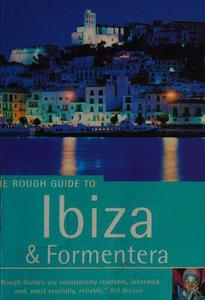
The Rough Guide Ibiza and Formentera By Iain Stewart
2003 | 400 Pages | ISBN: 1843530635 | PDF | 122 MB
INTRODUCTION Ibiza is an island of excess. Widely acclaimed as the worlds clubbing capital, its a unique and almost absurdly hedonistic place, where the nights are celebrated with tremendous vitality. Thanks largely to the British tabloid press, the popular perception of Ibiza is of a charmless, high-rise party destination, but, while its true that high-octane techno tourism is central to the local economy, theres much more to the island than the club scene. Ibizas scenery is captivating dotted around its dazzling shoreline are more than fifty beaches, ranging from expansive sweeps of sand to exquisite, miniature coves beneath soaring cliffs. Many of the best beaches were insensitively transformed into functional holiday resorts in the 1960s, but plenty of pristine places remain. Ibizas hilly, thickly wooded interior is peppered with isolated whitewashed villages and terraced fields of almonds, figs and olives. The cosmopolitan capital, Ibiza Town, has most of the islands architectural treats, including the spectacular walled enclave of Dalt Vila, and a historic port area with hip bars, stylish restaurants and fashionable boutiques. Within easy reach are the small beach resorts of Talamanca and Figueretes, pleasant enough places to spend a day by the sea. However, for a better selection of beaches, head for the disparate east coast, dotted with family resorts such as Cala Llonga as well as beautiful undeveloped coves like Cala Boix and Cala Mastella, and the slender sands of Aigües Blanques, a naturist beach. The east coasts main town, Santa Eulària is an agreeable but unremarkable place, though youll find a decent restaurant strip here as well as historical and cultural interest on the Puig de Missa hilltop above the town. The isolated, remote northwest is Ibizas least developed region, with a rugged coastline ideal for hiking, the two small resorts of Portinatx and Port de Sant Miquel, and a smattering of spectacular coves including the cliff-backed bays of Cala den Serra, Benirràs and Portitxol. Inland, the scenery is equally impressive, dominated by the lofty pine-clad Els Amunts hills; between these peaks lie a succession of diminutive, isolated settlements such as Sant Joan and Sant Miquel, each with its own fortified whitewashed church and a rustic bar or two. Ibizas bohemian character, rooted in 1960s ethics, remains particularly strong in the north of the island, where youll find yoga retreats, ethnic bazaars and a large population of hippy-minded residents. On the western coast, Ibizas second largest town, Sant Antoni, is no architectural beauty, but can boast a dynamic bar and club scene, plus a selection of mellower chillout bars on its much-touted Sunset Strip, home of the legendary Café del Mar. Sant Antonis beaches tend to get packed in high season, but west of the town, Cala Conta and Cala Bassa offer luminous water and fine, gently shelving sands. The wildly beautiful south of the island boasts over a dozen beaches, from tiny remote coves like Cala Llentrisca and Cala Molí to the sweeping sands of Salines beach and Es Cavallet on the outskirts of Ibiza Town two of Ibizas most fashionable places to pose. Serene, easygoing Formentera, the other main island of the Pitiuses, is just a short ferry ride south of Ibiza. With few historical sights apart from some sombre fortress-churches and a few minor archeological ruins, Formenteras main appeal is its relaxed, unhurried nature and its miles of ravishing, empty sands that shelve into breathtakingly translucent water. Comprised of two flat promontories linked by a narrow central isthmus, the island is very thinly populated; even Sant Francesc Xavier, the attractive but drowsy capital, is little more than village-sized. Though Formentera is equally dependent on tourism, its much less developed than Ibiza; its best beaches Platja Illetes and Platja Migjorn have barely been touched, and the sole resort, Es Pujols, is a pleasantly small-scale affair.
Links are Interchangeable - No Password - Single Extraction



